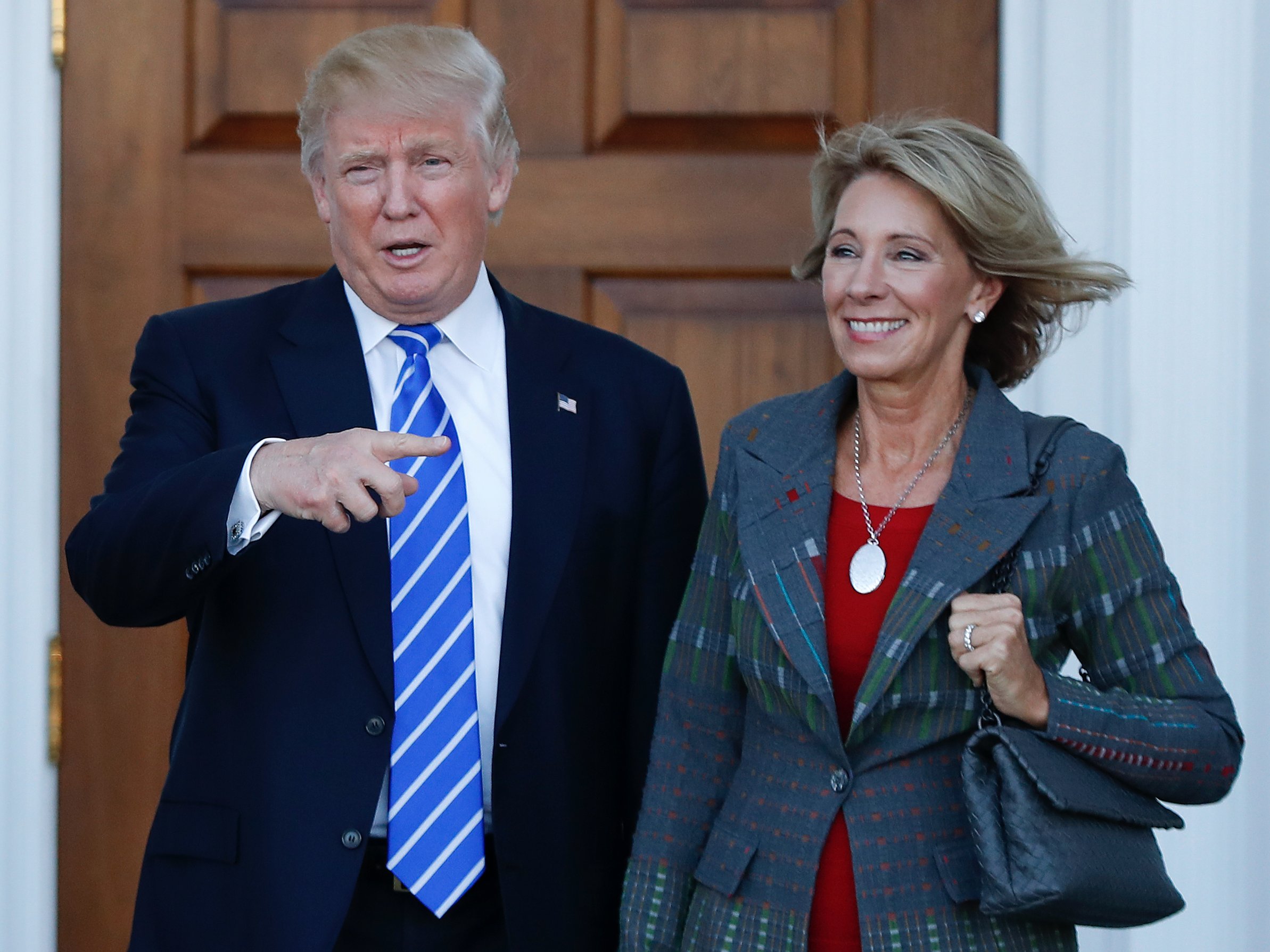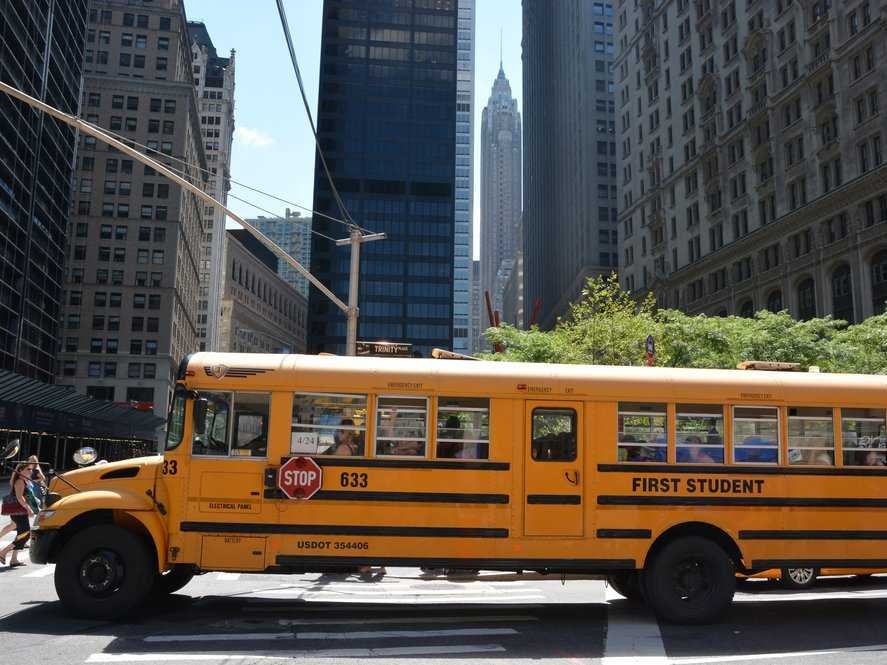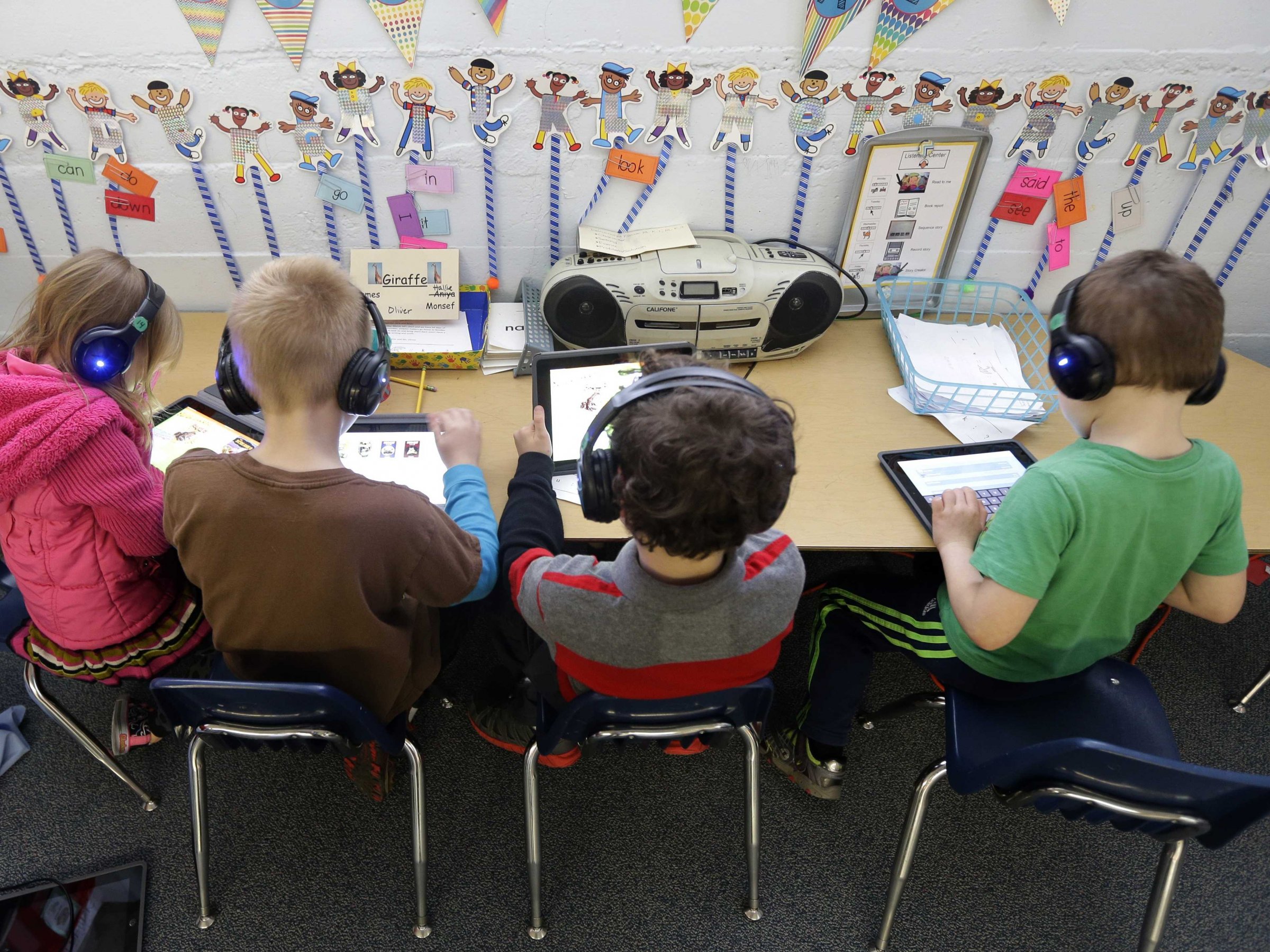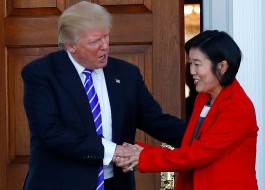
School-choice philanthropist Betsy DeVos is set to becomeDonald Trump’s secretary of education. The school choicemovement that Trump has embraced is bipartisan; centristDemocrats and Republicans both tend to support public charterschools.
But DeVos, a former chairwoman of the Michigan RepublicanParty, represents the most conservative corner of the movement.She and her husband have funded a series of effortsto turn public school funding into vouchers for students toattend private schools.
They have also fought to prevent charter schools, includingfor-profit charter schools, from being more tightly regulated.
The DeVos appointment signals that Trump is serious about the$20 billion school voucher plan he rolled out on the campaigntrail. The proposal would redirect huge swaths of the federaleducation budget away from school districts and towardlow-income parents, allowing them to spend a voucher at apublic or private school of their choice, potentially includingfor-profit, virtual, and religious schools.
On the plus side, families like having choices. In cities withstrong regulations on who can open a public charter school andhow it operates, such as New York and Boston, school choice hasdriven achievement gains for kids.Some private school voucher programs have even producedmild reductions in theracial and socio-economic segregation of poor students ofcolor. Still, the potential downsides are significant. Recentstudies of voucher programs in Louisiana and Ohio found that students whouse vouchers to attend a private school score, on average,lower on standardized tests than demographically similarstudents who do not use vouchers.
In New Orleans, two years after winning a private schoolvoucher, the average student had lost 13 points of learningin math. The reasons why point to the shortcomings of the Trumpproposal. The modest size of the voucher, about $5,500 in Louisiana,was not large enough to persuade the most exclusive privateschools to accept a more challenging student population. Manyof the private schools that did accept vouchers had experiencedprevious enrollment declines,indicating they were unpopular with parents who could afford topay tuition on their own.
 The DeVos appointment signals that Trump is seriousabout the $20 billion school voucher plan he rolled out on thecampaign trail.Shutterstock.com
The DeVos appointment signals that Trump is seriousabout the $20 billion school voucher plan he rolled out on thecampaign trail.Shutterstock.com
Public school student achievement in New Orleans has improved in recentyears, in part because of increased family choice amongnonprofit charter schools. But according to Douglas Harris, aneconomist at Tulane University and director of the EducationResearch Alliance for New Orleans, “We’ve never seen an effectas negative as the private school voucher program.” Harrisdoesn’t expect this evidence to dissuade Team Trump. “Of allthe ideas I’ve heard bandied about in various policy areas,this is the one most likely to happen. Trump is talking aboutit and clearly thinks it’s a good idea. Republicans love this.Most policy is going to be driven by Congress, probably evenmore so under Trump than any previous administration. This iswhat they want to do. The stars are aligned.”
Trump first rolled out the voucher plan outin early September, on the day he visited the ClevelandArts and Social Sciences Academy, a for-profit charter schoolthat received grades of D and F on a 2014–15 state report card,for failing to help its students improve academically. (Ingeneral, for-profit charter schools have posted dismal academic outcomes.)
It was a fitting setting. Trump’s voucher plan could be awindfall for companies hoping to make money from our publiceducation system. To craft its education platform, the Trumpcampaign tapped Rob Goad, an aide toRepublican Rep. Luke Messer of Indiana. Messer is a defender ofthe for-profit higher-education sector that President Obamafought to rein in. On K-12 issues, Messer introduced legislation knownas Title I portability, which seems to have inspired TeamTrump.
It would redirect funding away from Title I of the Elementaryand Secondary Education Act, a piece of civil rightslegislation championed by President Lyndon B. Johnson.Currently, those billions flow exclusively to public schoolsthat serve large percentages of poor children. The rationale,backed by decades of social science, is simple: It is mostexpensive and difficult to provide a quality education inenvironments of concentrated poverty, so schools that do sodeserve extra federal support. The Messer plan would, instead,use Title I to provide individual families with vouchers. Hisproposal goes further than portability plans introduced byother Republicans, in that it would allow religious and privateschools to participate, not just public charter schools.
Portability opens the door to for-profit schools, too,including the online-only virtual charter schools where,according to one largestudy, the average child learns far less than he or shewould at a traditional brick-and-mortar school.

“Trump’s coalition is very much built around rural voters,and they don’t have charters or many private schools,” Harrissays, because there are fewer school choices in regions withlow population density. “So the online virtual piece is verylikely to be part of this.”
Kevin Carey, director of education policy at New America, thenonpartisan think tank (and partner with Slate onFuture Tense), agrees. He points out that vouchers could bemade available to home-schoolers, a largely conservativeconstituency that relies on online education tools. “In allkinds of ways big and small, there will be a push to open upeducation funding to for-profit operators,” Carey predicts.
How will it be paid for? The math is pretty dicey. With 11million school-aged children living in poverty, $20 billionin federal funding equals just a $1,800 voucher per student.That’s far too little to pay for a year of education in anyschool, let alone one that hopes to eke a profit out of thearrangement.
In his Cleveland speech, Trump said he hoped that stateswould also choose to voucherize their education funding,giving families up to $12,000 to spend per child. Toencourage states to do that, Trump could follow PresidentObama’s lead and create an incentive. Obama’s signatureeducation program, Race to the Top, gave extra federaldollars to states that agreed to a variety of reforms, mostprominently, holding teachers accountable for student testscores. Trump could use a similar program design to pushstates to accept vouchers.
Of course, many state-level policymakers don’t want to dothat. The constituency for Title I funding as it currentlyexists is strong, comprising almost every elected Democrat inthe country, as well as bipartisan groups such as school boards. President Obama said hewould veto any education bill that included Title Iportability, because it would lead to reductions in funding forthe traditional public schools currently serving the poorestkids.
But it wouldn’t be impossible for Trump to find state-levelpartners. “To pull it off, he would have to find anenthusiastic governor and legislature who want to get onboard with a big privatization experiment,” Carey said. “Iimagine out of 50 states, he could find one.” Wouldprivatization be a cost-efficient way to help kids learnmore? It’s doubtful.
Read the original article on Slate. Copyright 2016. Follow Slate on Twitter.




